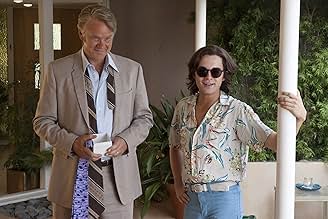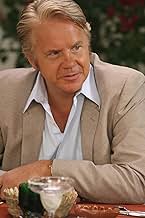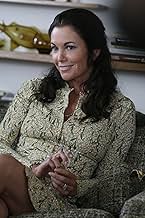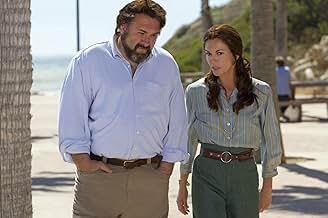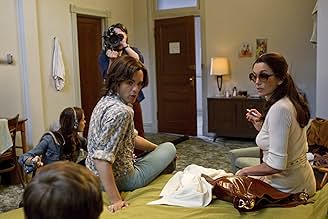Cinema Verité - A Saga de uma Família Americana
Título original: Cinema Verite
AVALIAÇÃO DA IMDb
6,5/10
4,1 mil
SUA AVALIAÇÃO
Uma visão dos bastidores da formação da primeira família americana a ser tema de um reality show.Uma visão dos bastidores da formação da primeira família americana a ser tema de um reality show.Uma visão dos bastidores da formação da primeira família americana a ser tema de um reality show.
- Direção
- Roteirista
- Artistas
- Ganhou 1 Primetime Emmy
- 7 vitórias e 34 indicações no total
Avaliações em destaque
"One must never let the public behind the scenes for they are easily disillusioned and then they are angry with you, for it is the illusion they love." The first successful reality show was on PBS and it was about the Loud family. The show followed around Pat (Lane) and Bill (Robbins) Loud and their family. It was the first of it's kind and this movie about how it started, what it was like while it was going on and the aftermath. I was actually pretty excited about watching this because of the cast. I have to say I was not disappointed at all. The acting was great in this and the movie itself was very entertaining. I have never been a fan of reality TV but it was very interesting to see how the genre began and the immediate impact that the show had. I do have to say though that as great as this movie is and how interesting it was to see the family problems come to the surface I still have no interest to watch the real "American Family" show. That in no way means that I did not enjoy watching the Loud family in this movie though. Overall, an excellent movie that should be watched. Very, very interesting and makes me wonder how accurate it is. I give it an A-.
Minor, though still entertaining cable-made docudrama from directors Shari Springer Berman and Robert Pulcini chronicling the would-be Sturm und Drang that went on behind-the-scenes of PBS's "American Family", an 11-hour television series in 1971 which presented the lives of The Louds, a "typical" family from Santa Barbara, CA. The Louds, who have since cemented their legacy as the first reality-TV family, brought in big ratings for the so-called "education network". Ordinary people, they were picked out of a society column by an ambitious producer and were followed around by a small camera-crew for some 78 days; still, high drama was hard to come by (patriarch Bill Loud had the wandering eye; eldest son Lance Loud was a flamboyant singer who had already moved to New York City when production began; while spouse Pat Loud, strong and confident, was the glue who kept kids and husband together). There wasn't much happening behind--nor in front of!--the lens, except for some mild flirting between Pat and the crafty, cunning producer, and Pat's discovery that her husband had been carrying on affairs with a number of different women. The editors of the actual show had a tough time piecing together enough watchable product, while this rendering of events, penned by the estimable David Seltzer, suffers the same fate. The groovy production-design is spot-on, and Diane Lane has several strong moments portraying Pat...yet this American family simply wasn't cliffhanger material. It all seems much ado about nothing.
CINEMA VERITE tries very hard to justify the trend it began in the 1970s by having a camera crew move into the household and private life of the well-to-do Loud family in Santa Barbara. The idea of a docudrama about a docudrama is acceptable as a flag for the obsession with Reality TV shows spawned by this experiment. Unfortunately the writing (by David Seltzer - apparently based on the book written by Pat Loud 'A Woman's Story' about the experience) is spotty and the recreation of (1971 when the 'series' was filmed and 1973 when it hit the television screens) reminds us how boring that time frame was. The direction by Shari Springer Berman and Robert Pulcini imitates the dreary 'spontaneity' of live action drama the film addresses. It plods, tripping on the cables for the cameras placed inside the home of this sad story.
Documentary producer Craig Gilbert (James Gandolfini) devises a concept for PBS he calls 'An American Family' and searches for a family that does not depict the happy-wappy family of staged productions but instead inters the privacy of an American family, examining all the aspects of that institution. He selects the Loud family, particularly because he sees Pat Loud (Diane Lane) as an early women's rights activist able to say truths others might avoid. Gilbert paces his documentary to unveil the dirt that hides behind the scenes - motivated to prod Pat to discover Bill (Tim Robbins) her husband's infidelity, which led her to seek a divorce. The Louds have two sons involved in the dream of becoming a rock band, a daughter in the throes of discovering teenage love, and a gay son Lance (Thomas Dekker) who has moved to New York to live a raucous life without the approval of his father but one visited by Pat without complete acceptance. The film crew consists of a married couple - Alan Raymond (Patrick Fugit) and Susan Raymond (Shanna Collins) - who reluctantly agree to film even the most embarrassing scenes of the film. The gradual crumbling of the Loud marriage - not helped by either Gilbert or by Pat's 'friend' Val (Lolita Davidovich) who is actually another one of Bill's affairs - is what producer Gilbert wants to record, and he succeeds. The Louds end their marriage, Lance later dies of AIDS, and the other children have minor successes in their lives. But the overriding feeling of this film is showing how the inquisitive media can be destructive in attempting to share reality with the world at large. And so began the glut of reality shows that yearly grow more irreverent in respecting privacy.
Diane Lane brings moments of brilliance to her role as the manipulated Pat and James Gandolfini is given the opportunity to push his acting chops. The problem is that we all know the quasi-tragic story on which this film is based, and making us witness it again is less than entertaining. It is disturbing.
Grady Harp
Documentary producer Craig Gilbert (James Gandolfini) devises a concept for PBS he calls 'An American Family' and searches for a family that does not depict the happy-wappy family of staged productions but instead inters the privacy of an American family, examining all the aspects of that institution. He selects the Loud family, particularly because he sees Pat Loud (Diane Lane) as an early women's rights activist able to say truths others might avoid. Gilbert paces his documentary to unveil the dirt that hides behind the scenes - motivated to prod Pat to discover Bill (Tim Robbins) her husband's infidelity, which led her to seek a divorce. The Louds have two sons involved in the dream of becoming a rock band, a daughter in the throes of discovering teenage love, and a gay son Lance (Thomas Dekker) who has moved to New York to live a raucous life without the approval of his father but one visited by Pat without complete acceptance. The film crew consists of a married couple - Alan Raymond (Patrick Fugit) and Susan Raymond (Shanna Collins) - who reluctantly agree to film even the most embarrassing scenes of the film. The gradual crumbling of the Loud marriage - not helped by either Gilbert or by Pat's 'friend' Val (Lolita Davidovich) who is actually another one of Bill's affairs - is what producer Gilbert wants to record, and he succeeds. The Louds end their marriage, Lance later dies of AIDS, and the other children have minor successes in their lives. But the overriding feeling of this film is showing how the inquisitive media can be destructive in attempting to share reality with the world at large. And so began the glut of reality shows that yearly grow more irreverent in respecting privacy.
Diane Lane brings moments of brilliance to her role as the manipulated Pat and James Gandolfini is given the opportunity to push his acting chops. The problem is that we all know the quasi-tragic story on which this film is based, and making us witness it again is less than entertaining. It is disturbing.
Grady Harp
In 1971 an all American family from Santa Barbara in California were chosen, seemingly at random, to take part in a TV experiment. It was to become the world's first reality TV show called "An American Family" and its stars, the Loud family – both by name and at times by nature, were to become national phenomena.
But to get to legendary status the show's producer, Craig Gilbert, had a pretty hard sell to the board of TV company PBS who were reluctant, to say the least, to commit to the show and began to baulk at the cost of production as the film stock costs (in particular) began to mount.
Their concern was about the "view-ability" of the show and whether it would find an audience. They needn't have worried because what gradually emerged was a tale of a swinging misogynist father (Tim Robbins), a hopeless and helpless (but sultry in Gilbert's opinion) Mom played brilliantly by Diane Lane and a screamingly gay son, Lance, played gleefully by Thomas Dekker. Not to mention a looky-likey Rolling Stones band fronted by the other two boys.
But it's what's going on in the mind of Producer Gilbert (played masterfully by James Gandolfini with a very unlikely full beard and absolutely no gangster element whatsoever to draw on) that is the meat of the movie. Well, I say a movie but it's actually a documentary set within a drama, about a reality TV documentary that turns out larger than life than any drama.
At points we see side by side comparisons between the "real" family and the 2011 actors. It's uncanny. Gandolfini manipulates all sides as he makes the "action" more and more interesting but in doing so contributes to the family meltdown and the confidence of his crew. It's terrific.
I don't think this ever made it to cinema, it's an HBO production, but it's great and I saw it last night on Sky Atlantic so is likely to be repeated at some time. If it is tune in because it's a little gem.
But to get to legendary status the show's producer, Craig Gilbert, had a pretty hard sell to the board of TV company PBS who were reluctant, to say the least, to commit to the show and began to baulk at the cost of production as the film stock costs (in particular) began to mount.
Their concern was about the "view-ability" of the show and whether it would find an audience. They needn't have worried because what gradually emerged was a tale of a swinging misogynist father (Tim Robbins), a hopeless and helpless (but sultry in Gilbert's opinion) Mom played brilliantly by Diane Lane and a screamingly gay son, Lance, played gleefully by Thomas Dekker. Not to mention a looky-likey Rolling Stones band fronted by the other two boys.
But it's what's going on in the mind of Producer Gilbert (played masterfully by James Gandolfini with a very unlikely full beard and absolutely no gangster element whatsoever to draw on) that is the meat of the movie. Well, I say a movie but it's actually a documentary set within a drama, about a reality TV documentary that turns out larger than life than any drama.
At points we see side by side comparisons between the "real" family and the 2011 actors. It's uncanny. Gandolfini manipulates all sides as he makes the "action" more and more interesting but in doing so contributes to the family meltdown and the confidence of his crew. It's terrific.
I don't think this ever made it to cinema, it's an HBO production, but it's great and I saw it last night on Sky Atlantic so is likely to be repeated at some time. If it is tune in because it's a little gem.
Naturally, it doesn't feel real. The first show of its kind, brought America into a debacle of sorts. Was this an "art form" or a voyeuristic trip into the unknown? Now, the whole thing feels manipulated, fragmented and utterly unreal. The gay son, brought the situation into the main stream but it was misunderstood, or was it? The one thing I got out of this films was a superlative performance by Diane Lane. She is truly extraordinary. But the task of reproducing the "moment" feels a bit all over the place. Going from highlight to highlight, if you didn't know about it you still won't really understand. This is no Truman Show. The dramatic structure seems not merely uncertain but downright opportunistic. Needless to say, I was disappointed.
Você sabia?
- CuriosidadesIn the scene where Lance Loud is on the phone with his family, he reads a media description of himself and his "flamboyant, leech-like homosexuality". That's a direct quote from an article written for The New York Times by Anne Roiphe. She made equally scathing remarks about the entire Loud family.
- Erros de gravaçãoThe Louds' Mercedes has a California plate with the number style 1AAA000. These plates did not appear until 1980.
- ConexõesFeatured in The Tonight Show with Jay Leno: Episode #19.129 (2011)
- Trilhas sonorasDream A Little Dream
Written by Fabian Andre, Gus Kahn & Wilbur Schwandt
Performed by Cass Elliot (as Mama Cass)
Courtesy of Geffen Records under license from Universal Music Enterprises
Principais escolhas
Faça login para avaliar e ver a lista de recomendações personalizadas
Detalhes
- Tempo de duração1 hora 26 minutos
- Cor
- Mixagem de som
- Proporção
- 1.78 : 1
Contribua para esta página
Sugerir uma alteração ou adicionar conteúdo ausente


